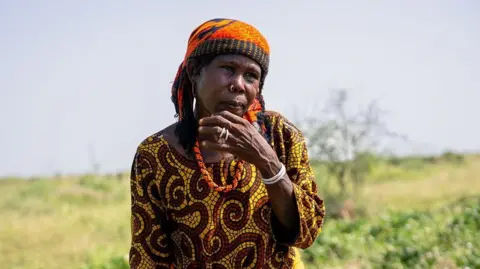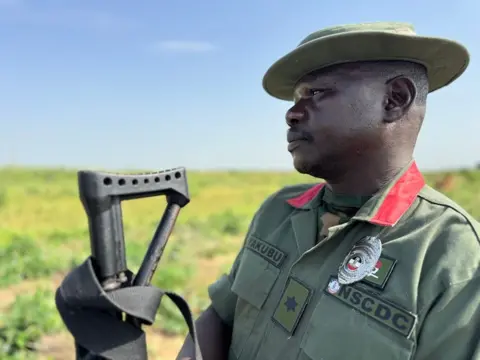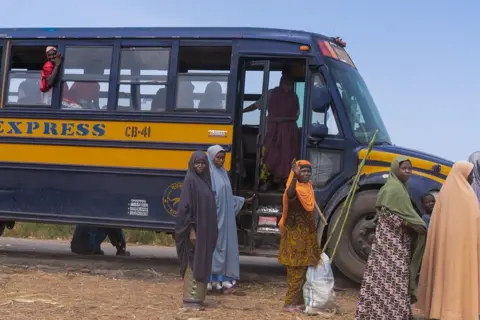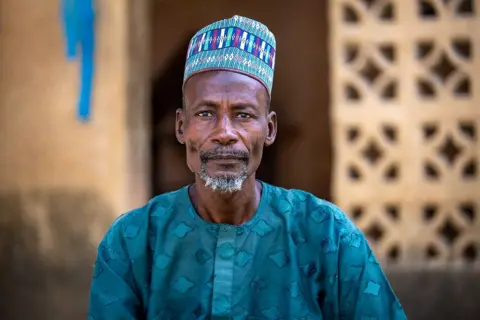 Ayo Bello / BBC
Ayo Bello / BBCAs women water vegetables and uproot weeds in a rural corner of north-eastern Nigeria, men in uniform stand guard nearby holding huge rifles.
They are Agro Rangers – a special security unit set up by the government to defend farmers from militants from jihadist groups Boko Haram and Islamic State West Africa Province (Iswap), who can strike farms in Borno state at any time.
“There is fear – we fear for our souls,” Aisha Isa, 50, tells the BBC as she tends to her crops.
Because it is no longer safe for her family to live in the home they fled 11 years ago, she and many others like her are bussed into Dalwa village from a pick-up point in the state capital, Maiduguri, early in the morning. It is less than an hour’s drive away.
She now lives in temporary housing, and growing beans and maize remains the only way for her to feed her family, she says.
“We will take the risk and come even if the rangers are not coming.”
Here, the military has marked out a stretch of land, surrounded by clearly defined trenches, where people can plant their crops. If they venture beyond that border, the threat of Boko Haram looms large.
“We have been hearing people are being kidnapped,” says 42-year-old Mustapha Musa. “Some are killed. That is why I’m scared and don’t want to come without security protection.”
The father of 10 says he left his village, Konduga, 13 years ago and will not resettle there until the government brings about lasting security.
In the 15 years since the Islamist insurgency began in north-eastern Nigeria, thousands of people have died and millions have been forced from their homes.
The number of people killed in targeted attacks on farmers this year has more than doubled since 2024, according to research by the Armed Conflict Location and Event Data (Acled) monitoring group.
Yet the governor of Borno state is speeding up the reintegration of displaced people from camps back onto the land – as part of his stabilisation agenda, and to counter disruptions in food production.
 Ayo Bello / BBC
Ayo Bello / BBCAlmost four million people face food insecurity across conflict zones in Nigeria’s north-east, the UN warns. But some aid agencies say move to relocate farmers to boost agriculture has moved too fast.
International Crisis Group, a non-profit organisation focused on resolving deadly conflict, says the policy is putting internally displaced people in danger -highlighting that militant groups extort farmers in areas that it controls to raise funds for its violent extremism.
Kidnapped along with nine other farmers and still terrified long after the ordeal, Abba Mustapha Muhammed has seen first-hand what happens when victims do not pay up.
“There was one that got killed because he couldn’t pay the ransom. His family could not meet the time given,” says Mr Muhammed. “He was killed and thrown away. They asked the family to come and take the dead body.”
Being held captive in dense forest for three days was “unbearable”, he says. “The small meals they prepared often left us feeling hungry and gave us diarrhoea. There was no clean drinking water.”
The father-of-three tells the BBC he is too afraid to return to subsistence farming because “the insurgents are still lurking. Just yesterday, they abducted over 10 people”.
 Ayo Bello / BBC
Ayo Bello / BBCDespite stories like these, Mohammed Hassan Agalama, the commander who leads the Agro Rangers scheme in Borno, insists that the guards deter militants from staging violent assaults.
“We have not encountered more terrorists coming to attack the farmers because they know that we are fully on ground at the time of farming season,” says Cdt Agalama, who operates under the Nigeria Security and Civil Defence Corps (NSCDC).
James Bulus, a spokesperson for the NSCDC, argues that the government is making gains in its fight against the insurgents, telling the BBC: “The harvest alone is there to tell you that normalcy has returned, and farmers are doing their normal businesses in the farm.”
However, he admits that resources are inadequate.
Agro Rangers is a small-scale project and not a long-term solution for widespread regional insecurity.
“We cannot be everywhere. We are not spirits. Can 600 armed Agro Rangers cover the whole of farms in Maiduguri? No.”
For this reason, Nigeria’s federal government says it plans to expand the Agro Rangers scheme.
Acled’s senior Africa analyst Ladd Serwat says this year has seen a surge in the number of reported civilian fatalities due to targeted attacks on farmers by armed groups.
Furthermore, during the first half of 2025 reported killings by Boko Haram and Iswap reached their highest level in five years.
 Ayo Bello / BBC
Ayo Bello / BBCOver in Maiduguri’s city centre, a group of farmers gather in the home of Adam Goni, the chair of the Borno branch of the National Association of Sorghum Producers, Processors and Marketers.
The men sit on rugs beneath the wide boughs of a tree, while two women sit on mats in the shade of a nearby veranda, as goats and chickens roam the compound.
The entire group has had their lives irrevocably changed by violence.
Among them is Baba Modu, whose 30-year-old nephew was gunned down on his farm by Boko Haram.
“It pains me so much,” he says. “They killed humans like an ant, without remorse. The killings we’ve experienced have been devastating, but this year is the worst. When I go out to farm, there’s a constant threat of being killed. I don’t have peace of mind even at home – I often sleep with my eyes open, feeling like we might be attacked.”
Mr Modu sinks into his chair at times, pausing in deep contemplation. He says the constant insecurity weighs heavily on him and the community.
“Even if you are starving and food is scarce, you can’t go to the farm. When we try, they chase us away or even kill us. At first, they would demand a ransom when they abducted someone, but now they collect the money and still kill the person they have kidnapped.”
Many farmers, like Mr Modu, say the militants can outnumber and overpower the Nigerian army when they attack.
“Sometimes even the security operatives run away when they see the insurgents,” he adds.
On one side of the compound, Mr Goni tends to a potato patch.
He tells the BBC that he has 10 hectares (24 acres) of land ready to be harvested 8km (5 miles) away, but he is terrified to gather his crops.
The owner of the neighbouring farm was killed on his land only weeks ago.
“There’s no safety. We are just taking risks to go there, because when you go to farm these Boko Haram people are there,” he says. “If you are not lucky, they will kill you.”
Mr Goni believes the military could do more to end the conflict.
“We are very angry. We are unhappy with what is happening. If the government is serious, within a month, Boko Haram will end in Nigeria.”
Meanwhile, the NSCDC’s Mr Bulus says the military is addressing the wider conflict.
“Peace is gradual. You cannot do it in one day. It has to undergo so many processes.”
But the process has taken too long for these farmers. More than 15 years on, insecurity continues to plague every aspect of people’s lives.
The BBC asked the Nigerian military about the farming community’s claims that it has not done enough to protect them, but it has not yet responded.
More BBC stories about Nigeria:
 Getty Images/BBC
Getty Images/BBC
